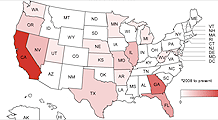9 banks in major holding company fail
FBOP's banks in California, Illinois, Texas and Arizona bring the number of '09 failures to 115. Depositors insured up to $250,000.
NEW YORK (CNNMoney.com) -- Nine subsidiaries of FBOP Corp., a multistate holding company that included California National Bank of Los Angeles, succumbed Friday to the nationwide banking crisis, bringing to 115 the number of banks closed by regulators so far this year.
The Federal Deposit Insurance Corp. said the nine banks in California, Illinois, Texas and Arizona that made up the privately held FBOP were taken over by U.S. Bancorp (USB, Fortune 500) of Minneapolis. The banks, which had combined assets of $19.4 billion and deposits of $15.4 billion, will open Saturday as U.S. Bank branches.
The nine banks are Bank USA N.A. of Phoenix, California National Bank of Los Angeles, San Diego National Bank of San Diego, Pacific National Bank of San Francisco, Park National Bank of Chicago, Community Bank of Lemont in Lemont, Ill., North Houston Bank in Houston, Madisonville State Bank in Madisonville, Texas, and Citizens National Bank of Teague, Texas.
Together, the nine banks had 153 offices.
Customers of failed banks are protected, however. The Federal Deposit Insurance Corp., which has insured bank deposits since the Great Depression, currently covers customer accounts up to $250,000.
Customers of the failed bank can access their money over the weekend by writing checks or using ATMs or debit cards. Checks will continue to be processed, and borrowers should make mortgage and loan payments as usual.
The FDIC said it entered into a loss-share transaction with U.S. Bank on $14.4 billion of the $18.2 billion in combined purchased assets. Under that arrangement, the agency said U.S. Bank will share in the losses on the asset pools covered in an effort to maximize returns on the assets by keeping them in the private sector.
"This transaction is consistent with the growth strategy that we have outlined many times in the past, which includes enhancing our existing franchise through low-risk, in-market acquisitions," said Rick Hartnack, vice chairman of consumer banking for U.S. Bancorp, in a statement.
Starting in 1981 with one bank -- First Bank of Oak Park, Ill., from which the firm takes its name -- owner Michael Kelly built FBOP through acquisitions into the nation's 46th largest bank-holding company, according to Federal Reserve data, with more than $18 billion in assets.
But FBOP was hit hard in September 2008 when Treasury took over Fannie Mae (FNM, Fortune 500) and Freddie Mac (FRE, Fortune 500), the government-sponsored mortgage investors. Treasury's decision to wipe out those firms' preferred stock left numerous banks and insurers nursing losses.
FBOP has also been hurt by its longtime focus on commercial real estate. FBOP posted a loss of $708 million for 2008. By the end of June, FBOP's resources had dwindled so low that the firm ranked below 98% of similar bank holding companies in terms of tier 1 leverage ratio, a measure of bank capital.
In August, FBOP signed a so-called written agreement with the Fed that gave it a schedule to raise capital, improve risk management and reduce its concentration of commercial real estate loans. The bank was to submit a capital plan within 30 days.
The biggest of FBOP's banks was California National, the nation's 101st largest. It had assets of $7.1 billion, and 66 branches throughout the greater Los Angeles area.
The bank failure count for 2009 is still far from 1989's record high of 534 bank closures which took place during the savings and loan crisis. There are about 8,000 banks in the nation, and an average of 10 banks have failed per month this year, nearly four times the number that failed in 2008, and the highest tally since 1992 when 181 banks failed.
This year's failures have already reduced the FDIC's insurance fund to below $10 billion from $45 billion a year ago. Friday's closure will cost the FDIC an estimated $2.5 billion.
After factoring in expected closures, the agency says its insurance fund is in the red and will remain there through 2012. Over the next four years, the agency expects bank closures will cost $100 billion.
The insurance fund also carried a negative balance during the savings in loan crisis.
In September, the FDIC discussed how to raise money to restock the fund last and proposed that banks prepay their deposit insurance premiums for the next three years.
-- CNNMoney.com assistant managing editor Mark M. Meinero, contributing reporter Hibah Yousuf and Fortune senior writer Colin Barr contributed to this story. ![]()


